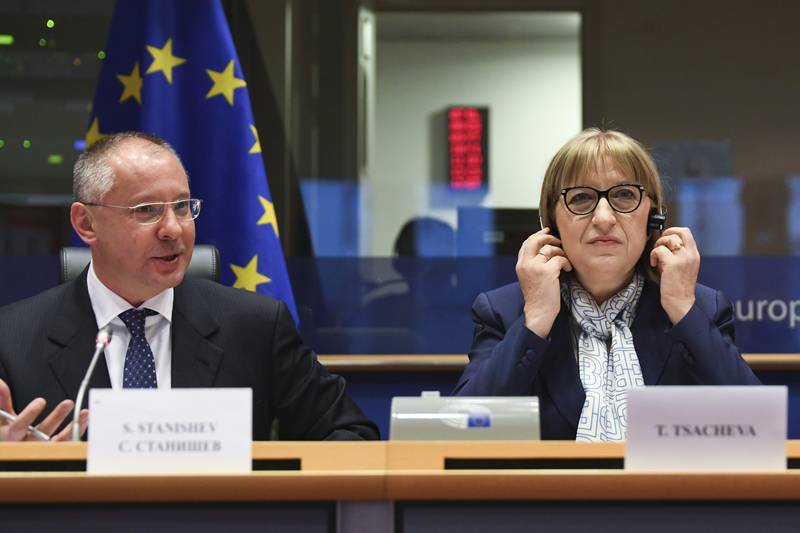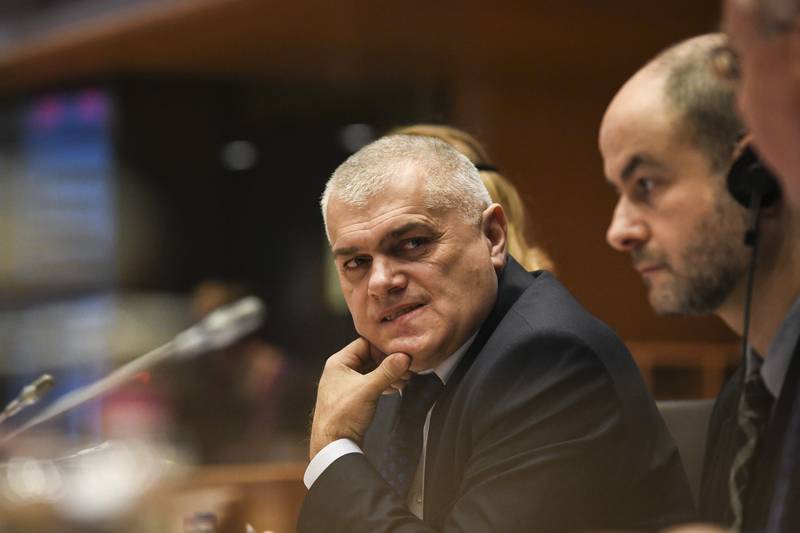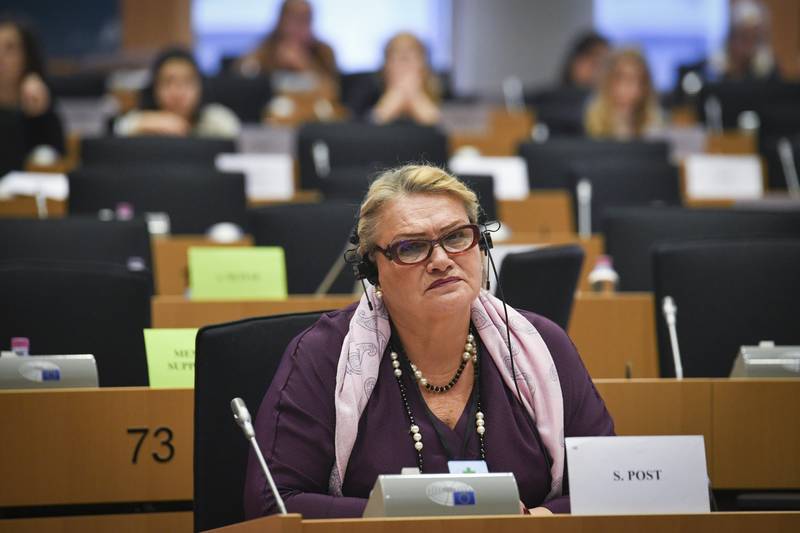The Bulgarian EU Presidency - Time To Look in the Mirror
Adelina Marini, January 23, 2018
 The first presentation of priorities of the Bulgarian presidency of the EU Council in the European Parliament was also Bulgaria's first look in the European mirror. And the image there did not look good. This happened in the European Parliament's committee on civil liberties, justice and internal affairs (LIBE) which, in the past years, because of migration and the growing integration in the area of justice, has turned into one of the most influential committees in EP. The first hearing was probably the most unpleasant one because it covers an area where Bulgaria has been failing ever since its EU membership. On January 11, while Sofia was celebrating the official opening of the Council presidency, two ministers faced the MEPs from the said committee - Minister of Justice Tsetska Tsacheva and Minister of Interior Valentin Radev.
The first presentation of priorities of the Bulgarian presidency of the EU Council in the European Parliament was also Bulgaria's first look in the European mirror. And the image there did not look good. This happened in the European Parliament's committee on civil liberties, justice and internal affairs (LIBE) which, in the past years, because of migration and the growing integration in the area of justice, has turned into one of the most influential committees in EP. The first hearing was probably the most unpleasant one because it covers an area where Bulgaria has been failing ever since its EU membership. On January 11, while Sofia was celebrating the official opening of the Council presidency, two ministers faced the MEPs from the said committee - Minister of Justice Tsetska Tsacheva and Minister of Interior Valentin Radev.
At European level their portfolios are currently the toughest because a large-scale reform is under way related to asylum, border security, relocation of refugees, ensuring legal migration, fight against money-laundering, funding of terrorism, and other sensitive issues for the EU in the past years. Some of these issues cause the biggest divisions in the EU since the debt crisis in the euro area. Following Hungary's example of 2011, however, instead of inspiring a discussion on these many issues, the Bulgarian ministers were attacked by MEPs about corruption in Bulgaria, the Istanbul convention, the construction of fences along the external border, and about bad treatment of Roma people.
The hearing was chaired by former Bulgarian prime minister Sergey Stanishev, who is a vice chair of the LIBE committee and is a leader of the Party of European Socialists. Almost all criticism came from the parliamentary group of this party, which is important to note because the Bulgarian member of this European political family - the Bulgarian Socialist Party - is among those political forces in Bulgaria who oppose the ratification of the Istanbul convention, which is aimed at protecting against gender-based violence.
Ana Gomes (S&D, Portugal) tried to understand why is there a controversy in Bulgaria about the ratification of the convention. "The debate is very disturbing for me. The arguments that this convention will legalise a third sex are disgraceful. This is completely contrary to the objectives of the European presidency", she said. The MEP was also concerned with excise duty fraud in Bulgaria, which, in her words, amount to 10 bn euros per year.
The Portuguese MEP recalled that such fraud is often used to finance terrorism and asked what will the presidency do to fight money laundering. Christine Revault D'Allonnes Bonnefoy (S&D, France) is a rapporteur on the Istanbul convention. She demanded to know when will Bulgaria adopt, along with the ratification bill, also a statute-book for application of the convention. The French MEP asked also what is the Bulgarian position on the disrespect of rule of law in some member states, having in mind Poland. Another female member of the committee from the S&D group, Soraya Post (Sweden), also expressed concern with the developments in Bulgaria.
 "I myself am concerned that a third of your government belongs to the far-right. They do not share the EU values. I'm worried also with what is happening in Bulgaria in terms of hate speech and violence against Muslims, Roma and refugees. Listening to you, your slogan is 'United we stand strong', freedom, security, justice but for your Roma people the latter three words simply do not exist, and I ask myself how will you approach the situation of your minorities. They face antiziganism on a daily basis", said the Swedish MEP and asked what are the intentions of the Bulgarian presidency to protect human rights and especially to handle the antiziganism phenomenon.
"I myself am concerned that a third of your government belongs to the far-right. They do not share the EU values. I'm worried also with what is happening in Bulgaria in terms of hate speech and violence against Muslims, Roma and refugees. Listening to you, your slogan is 'United we stand strong', freedom, security, justice but for your Roma people the latter three words simply do not exist, and I ask myself how will you approach the situation of your minorities. They face antiziganism on a daily basis", said the Swedish MEP and asked what are the intentions of the Bulgarian presidency to protect human rights and especially to handle the antiziganism phenomenon.
The female critical chorus of the Social Democrats was joined by Kati Piri (The Netherlands). She is a rapporteur on Turkey and is well known for her criticism against the regime of Turkish President Recep Tayyip Erdogan. She, too, demanded to know Bulgaria's position on the Commission's proposal to trigger Article 7 of the Treaty of EU against Poland. Kati Piri sharply criticised the ministers because of corruption as well, showing them a report which quotes more than 300 complaints of people who crossed Bulgaria and were asked for bribes by the border or the traffic police. "Eleven years after its accession to the EU, Bulgaria is still under monitoring of the Cooperation and Verification Mechanism, and this process is not complete yet. A major problem is precisely corruption and people in Bulgaria, I suppose, hope that such problems will be efficiently resolved", Ms Piri said.
Cécile Kashetu Kyenge (S&D, Italy) asked whether the Bulgarian presidency had a strategy to integrate migrants and what Bulgaria's opinion were about legal migration. Dutch MEP Judith Sargentini from the group of Greens and the European Free Alliance asked how will Bulgaria work on merging the positions of member states regarding relocation of refugees since Bulgaria itself has not yet fulfilled its quotas, although it has not rejected them.
The Bulgarian ministers answered all these questions and criticism vaguely or even refuted some of them. Tsetska Tsacheva assured that the Istanbul convention will be ratified. According to her, it is normal to have a debate in a democratic society. "Freedom of speech suggests hearing different positions, but I am convinced that after the government adopted the draft law on ratification it will be discussed urgently in the Bulgarian parliament", she responded. Regarding Article 7, Tsetska Tsacheva was cautious emphasising only that the rule of law is a fundamental value of the EU. She did not commit with a position nor a date when will the issue of Poland be on the agenda of the Council. While she was answering the MEPs, in Sofia, Prime Minister Boyko Borissov admitted that Bulgaria would do everything possible to avoid this issue be discussed during the Bulgarian presidency.
Regarding hate speech, Mrs Tsacheva said that the issue was quite complex. "First, you all know that there is no legal definition of hate speech. Secondly, it is very complicated to reach a balance between the freedom of speech, on the one hand, and protection of personal rights on the other". Valentin Radev disagreed with the data Kati Piri quoted from the report she showed. According to him, this is a private matter. Initially, he said that a large part of the over 300 complaints were justified but then he changed position, saying that most of them are not justified and do not deserve "such an  attention". He recommended Ms Piri to look for data in European institutions if she does not trust the Bulgarian ones.
attention". He recommended Ms Piri to look for data in European institutions if she does not trust the Bulgarian ones.
On the issue of the Dublin regulation, which is the apple of discord in the EU currently, Valentin Radev said the Bulgarian presidency will focus entirely on technical work. This means that the ministers will discuss in the Council article after article without discussing procedures. He promised that Bulgaria will set an example regarding relocation of refugees. There was no friendly fire from the EPP group. The only MEP who spoke on behalf of this group was Roberta Metsola from Malta, who is otherwise very critical toward her own country on the issue of rule of law. The Maltese MEP asked only questions related to EU issues.
 Entrance to the Berlaymont building | © EC - Audiovisual Service
Entrance to the Berlaymont building | © EC - Audiovisual Service | © European Union 2020, EC - Audiovisual Service
| © European Union 2020, EC - Audiovisual Service Commission President Ursula von der Leyen | © European Union 2019 - Source: EP
Commission President Ursula von der Leyen | © European Union 2019 - Source: EP